
Spring 2022
Message from the Dean
Dear Arts and Sciences Alumni and Friends,
As we celebrate the life and vibrancy of springtime, we are getting back together, with a host of activities on campus and beyond have renewed life.
We began this Spring Quarter almost fully back on campus and in-person, keeping an eye on pandemic conditions but resuming many in-person events. Below you will see that we hosted our “Conversations” series on campus again, welcoming Bruce Harrell, Seattle’s new mayor. Our LinkUp event went back to being in person, connecting current students and alumni in a professional networking event.
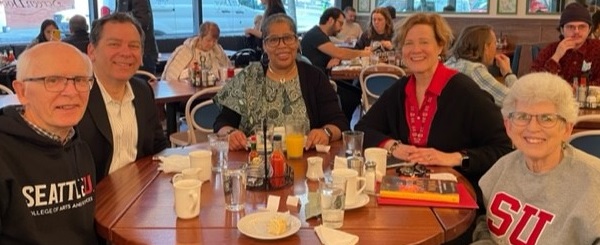 We’re traveling again too! I was fortunate to join President Eduardo Peñalver for a series of events for both SU alumni and accepted students in California, Oregon, Hawaii and Washington DC. It was a great opportunity to catch up with dear friends and show potential students what makes Seattle University so special. Many more events like this are coming, including Commencement on June 12 in the new Climate Pledge Arena.
We’re traveling again too! I was fortunate to join President Eduardo Peñalver for a series of events for both SU alumni and accepted students in California, Oregon, Hawaii and Washington DC. It was a great opportunity to catch up with dear friends and show potential students what makes Seattle University so special. Many more events like this are coming, including Commencement on June 12 in the new Climate Pledge Arena.
We remain mindful of conditions but are very happy to be more fully together again as a community. Read on for more events and accomplishments of our alumni, students, and faculty.
David V. Powers, PhD
Dean, College of Arts and Sciences
Photo, left to right, Gary Buckley, David Powers, Dean, College of Arts and Sciences, Cynthia Dillard, Dean, College of Education, Development Officer Peggy Fine, and Diane Buckley. The Buckleys established the Buckley Endowed Scholarship in Arts & Sciences.
In This Issue
- Supporting Behavioral Health for Ukrainian Refugees
- SU Asian Pacific Islander Desi American Student Association
- Seattle University Undergraduate Research Journal, Volume 6
- "Case of the Missing Lightning Bat" by Victor D. Evans
- New Partnership: Institute of Public Service and Seattle Channel
- Pathways to Professional Formation: LinkUp '22 A Success
Supporting Behavioral Health for Ukrainian Refugees
Dr. Kira Mauseth, SU Psychology, and team travel to Poland for nine days
In early April, Dr. Kira Mauseth, Senior Instructor, Psychology and co-lead of the Behavioral Health Strike Team for the WA State Department of Health, returned from nine days in Poland, where she and a team of four psychologists and one graduate student assisted in the behavioral health response for refugees in Poland who left Ukraine due to impacts of the war. Dr. Robert Porzak, Head of the Experimental Psychology Lab and member of the Faculty of Human Science, Economics and Innovation University in Lublin, Poland extended the invitation to the team. Dr. Mauseth was joined by Dr. Tona McGuire, her co-lead for the Behavioral Strike Team, Dr. Eric J. Bruns, UW SMART Center, Dr. Sharon Hoover, Co-Director, National Center for School Mental Health, Director, NCTSN Center for Safe Supportive Schools, and Robin Smith, a grad student and Mental Health Therapist.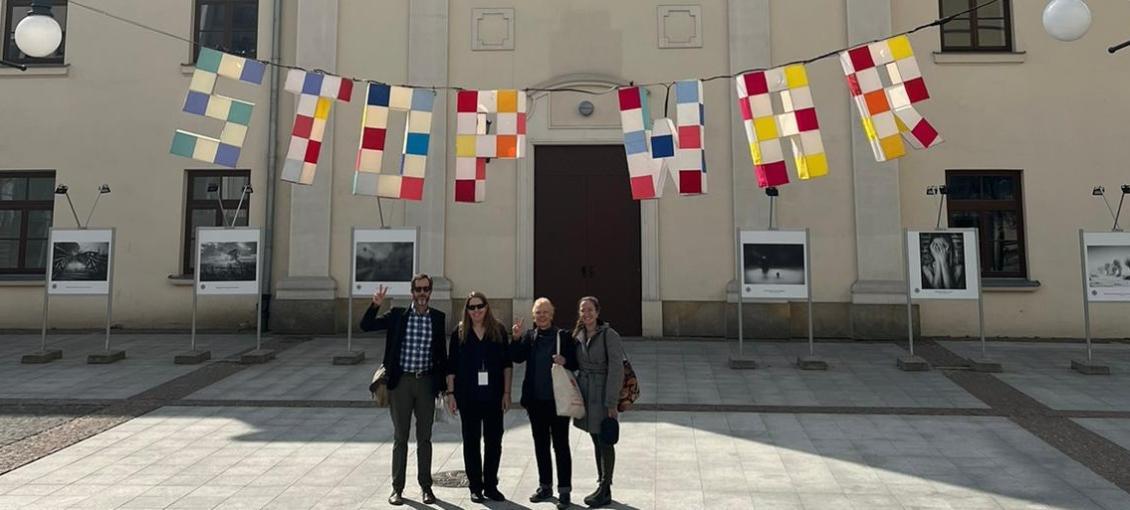
The Health Support Team (HST) training they provided is designed to help community volunteers understand the typical behavioral health impact of disasters on adults and children. In addition, the curriculum covers how to help community members with communication, de-escalation, building resilience, understanding behavioral health emergencies and when to refer, managing acute stress responses, and self-care for volunteers. Training was also offered on PsySTART Mental Health Triage, which can quickly help identify children and adults most at risk for psychological disorders and prioritize them for care.
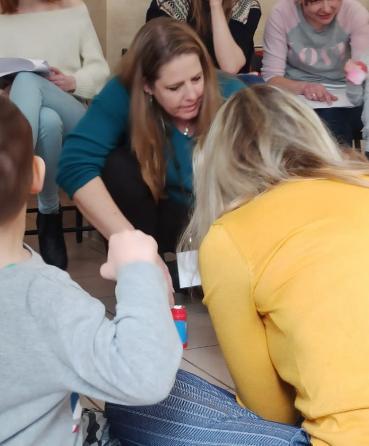 They also provided a “Train the Trainer” version of the curriculum to identify individuals with behavioral health training or background. The newly minted HST trainers are then able to continue to train HST to volunteers from impacted communities going forward, making this intervention culturally and linguistically appropriate as well as sustainable and not reliant on outside support.
They also provided a “Train the Trainer” version of the curriculum to identify individuals with behavioral health training or background. The newly minted HST trainers are then able to continue to train HST to volunteers from impacted communities going forward, making this intervention culturally and linguistically appropriate as well as sustainable and not reliant on outside support.
During their first two days, the team completed some training for the volunteers at Caritas in Lublin, the Catholic equivalent of the Red Cross in Poland, and the largest non-profit in the area doing refugee support. One trainee was recalling a recent refugee who just didn’t stop shaking. They were unsure of how to help her and thought maybe it was best to “just let her shake”. The team gave the aid worker some tips on how to help the refugee become grounded and engage her parasympathetic nervous system in order to regulate a bit more.
Next came a day to “train the trainer” where they trained Ukrainian and Polish volunteers who are already in leadership positions with the agency on how to provide evidence-based disaster behavioral health support for adults. One of the biggest challenges with this group occurred when they got to the part of the training about volunteers establishing healthy boundaries in order to take care of themselves. “Some of the people in the room literally laughed out loud,” Dr. Mauseth remembers, “‘There is too much need, too much work. We can’t rest,’ was what they told us. We worked with them on the idea that the support they provide will go much further if they are able to replenish their own energy along the way, but it was a challenging interaction.”
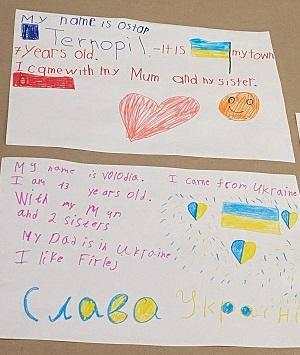 They travelled to another Caritas location outside Lublin to provide training for parents and caregivers of children. “This is the youth-oriented version of our training that provides information about what’s typical for kids in crisis and how adults can recognize and provide appropriate supports,” says Dr. Mauseth. “We worked directly with Ukrainian mothers and their children as well as the relief staff at Caritas to provide training. This was a really hard day for me as a mother with two young boys of my own, to see families separated, and parents doing their best when they too have been traumatized."
They travelled to another Caritas location outside Lublin to provide training for parents and caregivers of children. “This is the youth-oriented version of our training that provides information about what’s typical for kids in crisis and how adults can recognize and provide appropriate supports,” says Dr. Mauseth. “We worked directly with Ukrainian mothers and their children as well as the relief staff at Caritas to provide training. This was a really hard day for me as a mother with two young boys of my own, to see families separated, and parents doing their best when they too have been traumatized."
The team also conducted trainings sponsored by the mayor's office and cultural center in Lublin for the equivalent of the staff of the city crisis center, as well as a second group of librarians, caregivers, coaches and other mentors for kids.
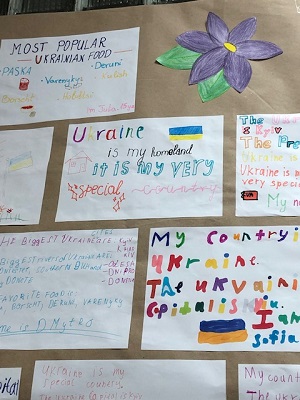 “There is no official refugee camp here so all of the refugees coming across the border nearby are being taken in directly by Polish families; staying in extra rooms, wherever they can find space,” she explains. Many are wondering ‘for how long’? And there is not yet a plan to address this. Children and adults who have been taken in are often experiencing very distressing symptoms (like waking up screaming in the middle of the night) and the host families don’t understand what to do to help them. We held two webinars for host families, live translated into Polish and Ukrainian, that provided information on how to manage those crises.”
“There is no official refugee camp here so all of the refugees coming across the border nearby are being taken in directly by Polish families; staying in extra rooms, wherever they can find space,” she explains. Many are wondering ‘for how long’? And there is not yet a plan to address this. Children and adults who have been taken in are often experiencing very distressing symptoms (like waking up screaming in the middle of the night) and the host families don’t understand what to do to help them. We held two webinars for host families, live translated into Polish and Ukrainian, that provided information on how to manage those crises.”
While in Poland, Dr. Mauseth taught her first two classes of the quarter virtually, at 1 and 3 a.m. her time. “We met via Zoom with my classes that were scheduled to meet in person. It was a great, although strange, start to my two sections of Senior Seminar despite the exhaustion. The theme for my senior seminar courses is ‘Turning Points’ major life events that shape how you come to be who and where you are at the present time. I thought it was apropos to be sharing one of my professional turning points in this type of relief work, with them in real time. We oriented to the start of the quarter, and I was also able to share some examples with them of the work and encounters I had had in Poland thus far."
The Seattle Times recently published an op-ed by the team, "We’ve seen firsthand Ukraine’s tragic behavioral-health crisis."
On a related note, a team of Psychology students, including Isabel Gilbertson, Sydney Lindell, Joanna Corpuz, and Sarah Ziegler, are lead authors of SAFE Summer: Tip sheet for Teens & Young Adults, developed with Washington State Department of Health’s Behavioral Health Strike Team for the COVID-19 response in partnership with the Behavioral Health Research Group at Seattle University.
Photos courtesy of Dr. Kira Mauseth
Seattle University APIDA Student Association
Alumni invited to engage with Asian Pacific Islander Desi American students
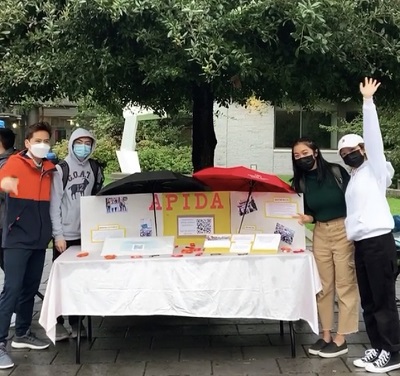 May marks APIDA Heritage Month (also known as AAPI Heritage Month.)
May marks APIDA Heritage Month (also known as AAPI Heritage Month.)
Matthew Conde, BABA Management and University Honors, ’23, and Madeleine Magana, BA Public Affairs, ’23, co-presidents of the Seattle University APIDA Student Association are excited to connect Asian Pacific Islander Desi American (APIDA) identifying students with a wider APIDA community.
APIDA Student Association is a community and space where students of Asian, Pacific Islander, and Desi American identifying communities can voice their opinions and participate in important issues. Grounded in understanding and care, the APIDA Student association seeks to promote education about the different types of APIDA traditions, heritages, cultures, and identities for equity and justice. Through shared support and care, APIDA Student Association strives to uplift APIDA students within the university and communities beyond campus walls through educational, leadership, and service opportunities.
“We established the service-learning and advocacy club in September 2021 to raise awareness and to empower APIDA students at SU,” said Madeleine.
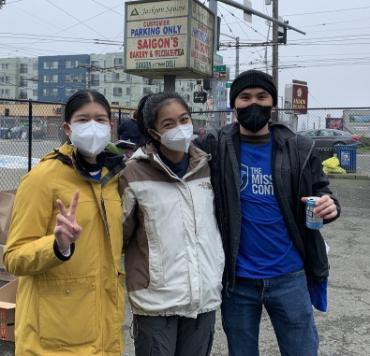 “Since last fall, we’ve participated in monthly service clean ups with Friends of Little Saigon and held teach-ins on various APIDA Lunar New Year perspectives, Chinatown-International District History, and other topics on APIDA representation,” said Matthew. “We look forward to expanding our club beyond undergraduates, learning from SU alumni and graduate students' experiences and making connections with the APIDA community.”
“Since last fall, we’ve participated in monthly service clean ups with Friends of Little Saigon and held teach-ins on various APIDA Lunar New Year perspectives, Chinatown-International District History, and other topics on APIDA representation,” said Matthew. “We look forward to expanding our club beyond undergraduates, learning from SU alumni and graduate students' experiences and making connections with the APIDA community.”
Asian Pacific Islander Desi American (APIDA) encompasses people from China, Japan, Korea, Taiwan, Philippines, Vietnam, Cambodia, Thailand, Laos, Myanmar, Bangladesh, Malaysia, Indonesia, India, and the Pacific islands of Melanesia (New Guinea, New Caledonia, Vanuatu, Fiji and the Solomon Islands), Micronesia (Marianas, Guam, Wake Island, Palau, Marshall Islands, Kiribati, Nauru and the Federated States of Micronesia) and Polynesia (New Zealand, Hawaiian Islands, Rotuma, Midway Islands, Samoa, American Samoa, Tonga, Tuvalu, Cook Islands, French Polynesia and Easter Island).
APIDA plans to expand their club beyond the present Seattle University community and to connect APIDA alumni with current SU students. They hope that collaborating with SU alumni can better help them connect with the university and greater Seattle communities.
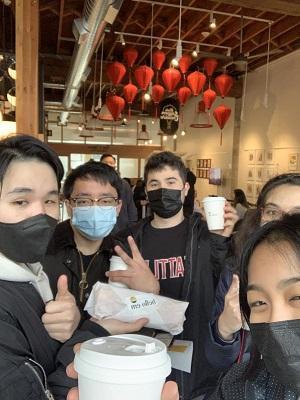 “One of the disconnects between APIDA SU students and their post graduate plans is the fact that they don’t know what resources are available from their communities with the same identities,” said Madeline. “One of our goals is to make them more accessible and one of the most underutilized resources are APIDA alumni and graduate students. We believe they can help us envision our futures, and how align with the APIDA community and integrating APIDA justice into whatever work we go into.”
“One of the disconnects between APIDA SU students and their post graduate plans is the fact that they don’t know what resources are available from their communities with the same identities,” said Madeline. “One of our goals is to make them more accessible and one of the most underutilized resources are APIDA alumni and graduate students. We believe they can help us envision our futures, and how align with the APIDA community and integrating APIDA justice into whatever work we go into.”
Matthew expands on that, talking about what the club has accomplished so far. “Our club members want to cultivate a space where people from different Asian heritages can come together, where they can discuss important issues that are affecting the communities, and then find ways to engage them.”
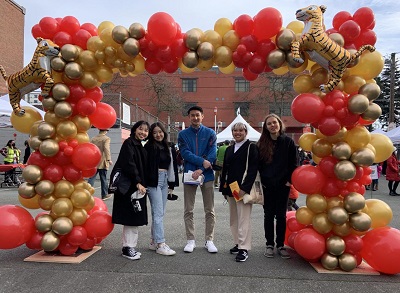 One club teach-in focused on Asian representation in journalism. A club outing to Wing Luke Museum explored how different APIDA culture celebrate Lunar New Year. Members also participated in two quarterly clean-ups in Little Saigon.
One club teach-in focused on Asian representation in journalism. A club outing to Wing Luke Museum explored how different APIDA culture celebrate Lunar New Year. Members also participated in two quarterly clean-ups in Little Saigon.
Matthew said, “Alumni may be able to open doors for other ways we can get involved with the greater Seattle community.”
Madeline said, “As undergraduate students, our presentations are very wide open. I think that alumni and graduate students could also help us explore topics more deeply. “
The co-presidents and members hope that engaging with alumni will also help make connections for both personal and professional development. They are interested in learning about others’ experiences of growing up as people of color, attending college, and then moving on to their careers. Connections leading to internships and jobs are also important.
“Having someone from our community to reach out to is so valuable,” says Matthew.
Join the Seattle University APIDA Student Association on the SU Quad, Saturday, May 28, from 10 a.m. to 2 p.m, for "Chalk Day." Students and community members are encouraged to draw something that represents their culture or identity, telling their story.
Interested in working with the association? Matthew and Madeleine would be happy to hear from you.

Photos courtesy of Seattle University APIDA Student Association
Seattle University Undergraduate Research Journal
Student authors and editors and faculty mentors collaborate on Volume 6
This quarter, the Seattle University Undergraduate Research Journal (SUURJ) is publishing Volume 6 on June 2 for the 2022 issue. Student authors and student editors (as well as their faculty mentors) have worked hard to professionally publish nine fresh and thought-provoking research papers written by our own SU undergraduate students.
You can read the previous five issues right now at no cost by visiting the SUURJ ScholarWorks page. All issues are available as digital downloads to everyone (not just SU students and alumni!) and are written and edited with multidisciplinary learning in mind. This means they’re engaging and educational for both seasoned professionals and newcomers into the subjects they’re focused on.

The research papers you can see this coming June are:
- Feminism and the Mexican Revolution.
- Climate Refugees Are Refugees and Deserve UN Recognition.
- Black Maternal Mortality in the U.S.
- Descartes’s Dualism and Its Influence on Our Medical System.
- The Influence of Social Capital on Drought Caused Climate Change: Low-Income Farmer Adaptation.
- Godly Queene Hester and the Appropriation of Jewish Narratives on the Tudor Stage.
- Female Saints and the Performance of Virginity in the Medieval Period.
- Future Peak Streamflow Analytics for the Skagit River.
- Parasite Hospitality: How Parasitic Helminth Worms Help Researchers Prevent Type 1 Diabetes.
Nine student authors—selected and screened from a pool of brilliant SU applicants from a wide range of disciplines—will be featured in Volume 6. They are: Alex Chapman, Ruby Polani Ranoa, Claire Andrews, Brooke I. Wynalda, Jordyn Correll, Katherine Howard, Kelemua Tesfaye, Adina Van Etten, and Afrikaan Sahra. All of their research occurred right here at Seattle University and covers everything from Literature to Environmental Science. Every one of these papers was written between the 2020 and 2021 Fall Quarters, proving that not even a global pandemic is enough to stop SU students from striving for excellence.
Working hand-in-hand with those authors were twelve student editors, who collaborated this past year to make sure that SUURJ is the best it can be. They’ve worked under the guidance of Prof. Tara Roth and Prof. Hannah Tracy, as well as faculty content editors who were able to give expert feedback in their fields. The year has encompassed a variety of tasks for SUURJ’s student editors, from screening papers for the best fit, polishing the papers in collaboration with the authors and faculty content editors, and working to get ready for the 2022 launch. This year’s student editors are Stephen Leach, Joanna Labot Corpuz, Kim Diaz, Lainey Ragsdale, Lee Sasaki, Edward Voloshin, Sareena Toothaker, Jack Kuyper, Bridget Conroy, Melat Ermyas, Nicole Beauvais, and Lily Kamālamalama.
The mission of SUURJ is to provide a platform for students of any discipline to participate in larger academic conversations by uplifting their voices and interests. With readers all over the globe, SUURJ has continued making this mission a reality. After June 2nd, you’ll be able to find Volume 6 (and all previous volumes) on the ScholarWorks page.
For more information about SUURJ, contact Prof. Roth and Prof. Tracy by email or visit the SUURJ website.
The Case of the Missing Lightning Bat" by Dr. Victor D. Evans
2022 Sharon James Lecture, May 17, 6 p.m., Casey Commons
 The Communication and Media Department presents the 2022 Sharon James Lecture, featuring Dr. Victor Evan’s new middle grade book. “The Case of the Missing Lighting Bat,” a new mystery that is one of very few featuring a middle grade, LGBTQ African-American character.
The Communication and Media Department presents the 2022 Sharon James Lecture, featuring Dr. Victor Evan’s new middle grade book. “The Case of the Missing Lighting Bat,” a new mystery that is one of very few featuring a middle grade, LGBTQ African-American character.
 Dr. Evans will read from the book, discuss it with Dr. Caitlin Carlson, and sign copies following the event.
Dr. Evans will read from the book, discuss it with Dr. Caitlin Carlson, and sign copies following the event.
About the book: Life hasn’t been entirely fair to Evan Sinclair, or ‘Sissy Sinclair’ as most of his classmates like to call him, but now it’s seventh grade - and the universe owes him. A missing baseball bat, belonging to star player Jayden Stevens, provides him with the perfect chance to put his love of detective shows to good use. His objective? Find the lucky “lightning bat” and score himself a place with the most popular kids in school: The Untouchables.
However, just like in the TV shows, nothing goes according to plan. As Evan delves into the investigation, his personal life turns to shambles. His father’s overbearing nature and extreme religious devotion lengthen the rift between them, while Evan is still processing the loss of his mother. His grandmother, his BFF, and an unexpected old friend are the only people he can count on to help him crack the case.
There are numerous suspects in Lincoln Middle School, but this mystery goes deeper, becoming even more complicated than anyone first thought. Is it just petty jealousy that has fueled this theft? Or is something more sinister going on behind the scenes of the baseball team? There’s one person who will stop at nothing to uncover the truth, even if that means confronting his own deep dark secret – it’s Evan Sinclair.
About the author: Dr. Victor Evans is an Assistant Professor in the Communication department at Seattle University. He has been teaching in higher education for over 19 years. Before teaching, Dr. Evans was an entertainment journalist, working with many organizations in both New York and Los Angeles, including Entertainment Weekly, People, MTV, Guest Informant and BET. He also worked as an entertainment producer for CNN’s Headline News. Dr. Evans is also a documentary filmmaker whose production company, CrossRoads Productions, creates media literacy videos to educate adolescents on various multicultural issues.
Free registration and the book available for purchase here.
New Partnership: Institute of Public Service and Seattle Channel
"Conversations": today’s leaders on today’s topics
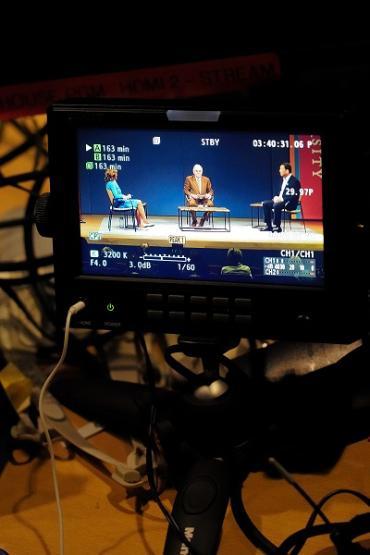 The latest in the IPS "Conversations" series, featuring Seattle Mayor Bruce Harrell, was also the inaugural episode for a new partnership between Seattle University and Seattle Channel. Bruce Harrell, after his first months in office, described plans for turning the city around, talking about all of it -- public safety, downtown revitalization, housing and overall well-being of the city. Harrell was interviewed on stage by Larry Hubbell, professor, Joni Balter, journalist, and graduate students Mandela Gardner and Camille Rochester.
The latest in the IPS "Conversations" series, featuring Seattle Mayor Bruce Harrell, was also the inaugural episode for a new partnership between Seattle University and Seattle Channel. Bruce Harrell, after his first months in office, described plans for turning the city around, talking about all of it -- public safety, downtown revitalization, housing and overall well-being of the city. Harrell was interviewed on stage by Larry Hubbell, professor, Joni Balter, journalist, and graduate students Mandela Gardner and Camille Rochester.
Next up for "Conversations": General Barry R. McCaffrey, USA (Ret.), a national security and terrorism analyst for NBC News and president of his consulting firm, BR McCaffery Associates and Gary Locke, former ambassador to China, for "Putin Confronts the Free World" on May 16. Register for free here.
Seattle Channel is an award-winning municipal television station that reflects, informs, and inspires the community it serves with a local mix of news, analysis, stories, and perspectives you won't find anywhere else.
Seattle Channel is on cable television channel 21 on Comcast (321 HD) and Wave (721 HD) for cable subscribers in Seattle. Programming is also available on Seattle Channel's website, on YouTube, or search or browse for older videos through the Seattle Municipal Archives Digital Collections.

Photos courtesy of Seattle University. Above: (l. to r.) Graduate students Camille Rochester and Mandela Gardner; Larry Hubbell, professor, Institute of Public Service; Joni Balter, journalist, Mayor Bruce Harrell; Eduardo Peñalver, President, Seattle University; and David V. Powers, Dean, College of Arts and Sciences.
News: College of Arts and Sciences Community
Pathways to Professional Formation
Thank you to all of our mentors who attended LinkUp on April 6. Our students were very excited to be back in person for this engaging opportunity.
Interested in connecting with students? Join Redhawk Landing today and create your user profile here; it takes only a few minutes.
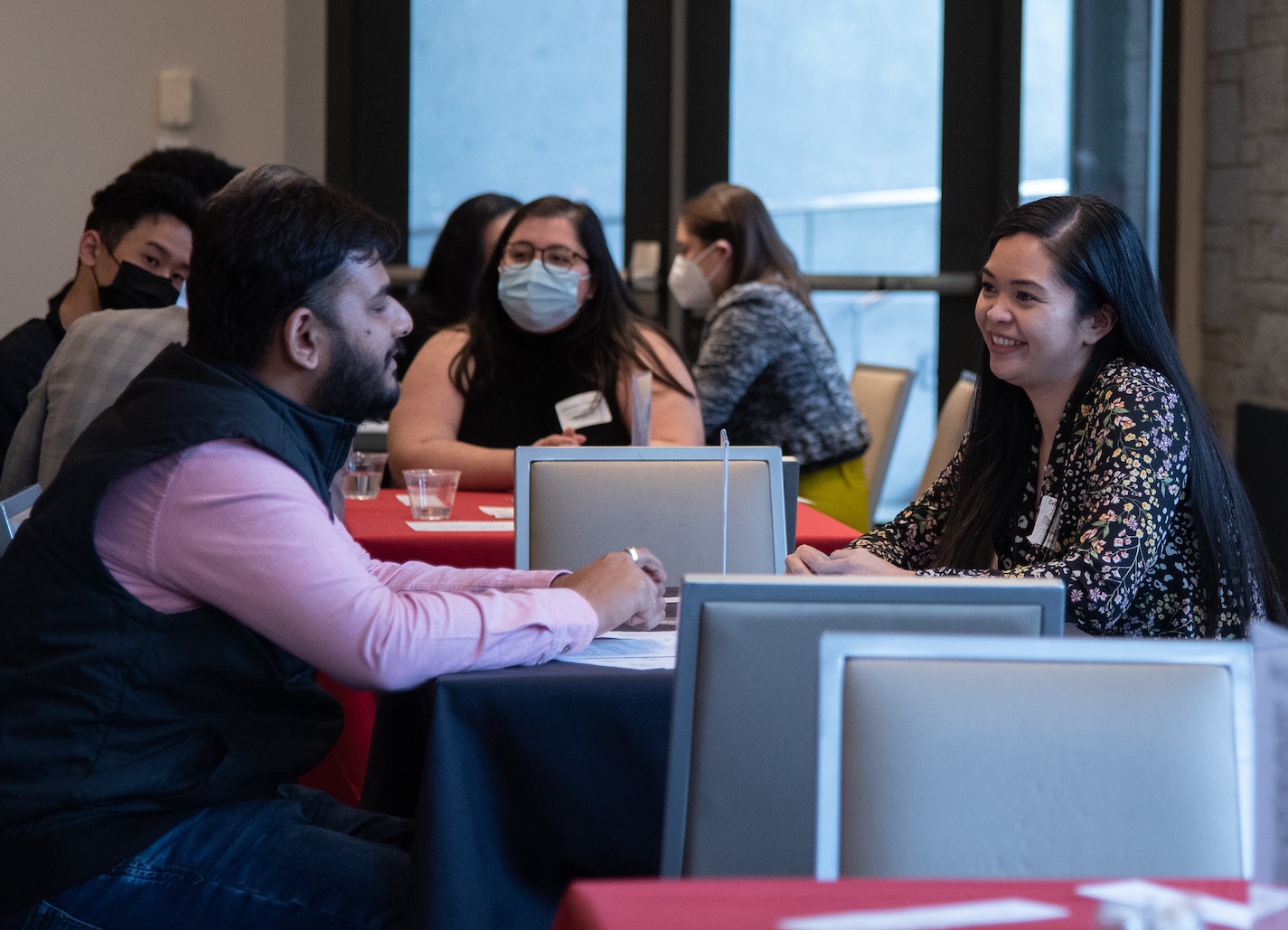
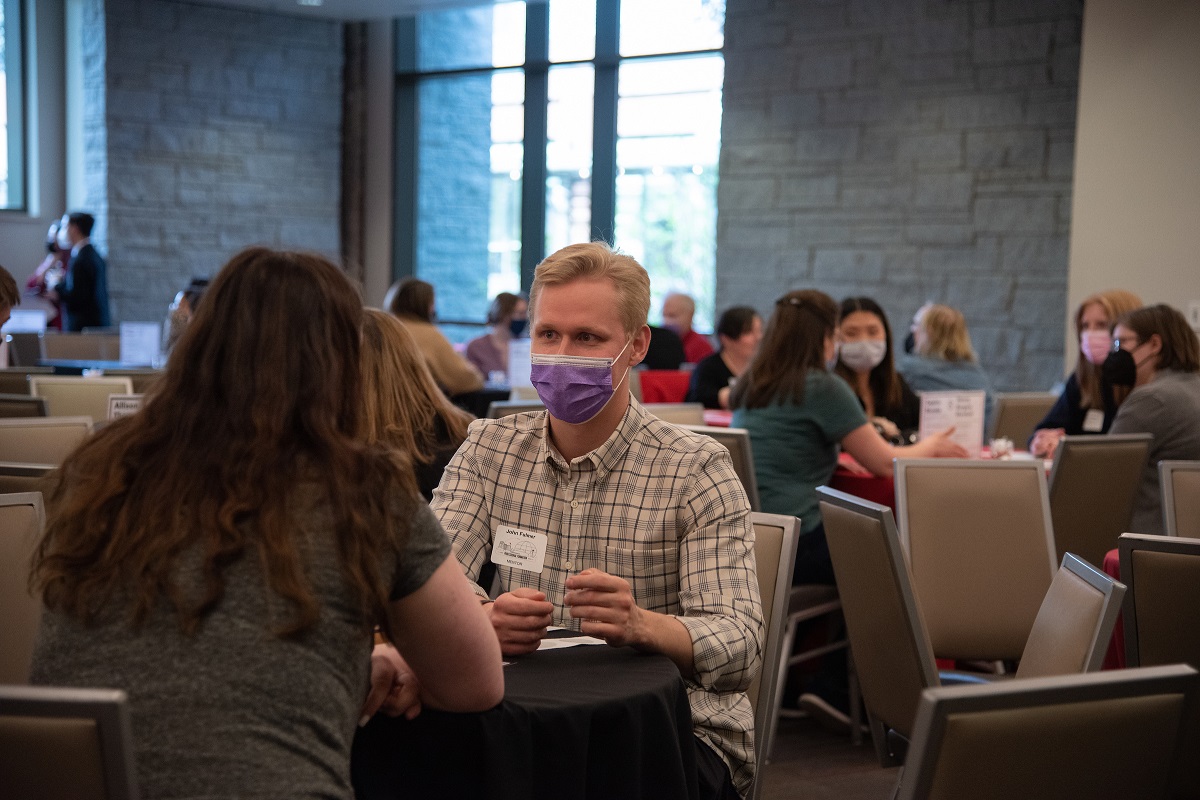
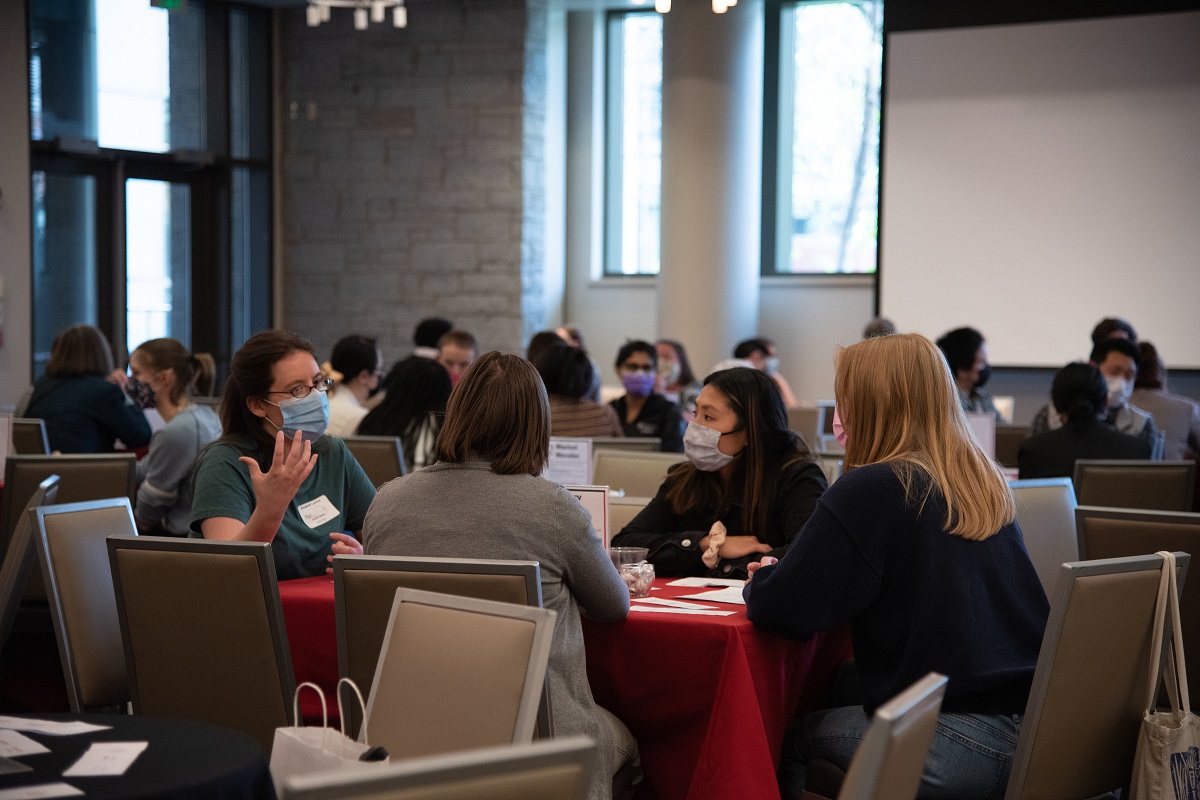
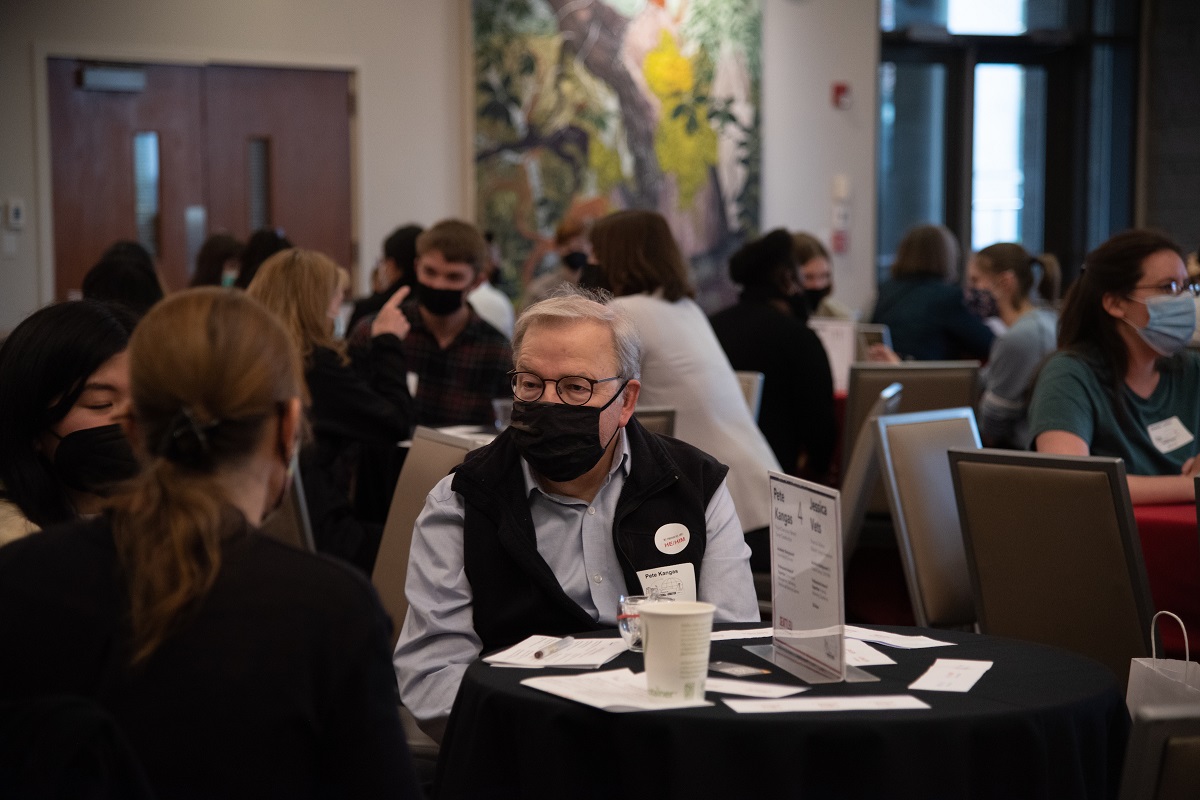
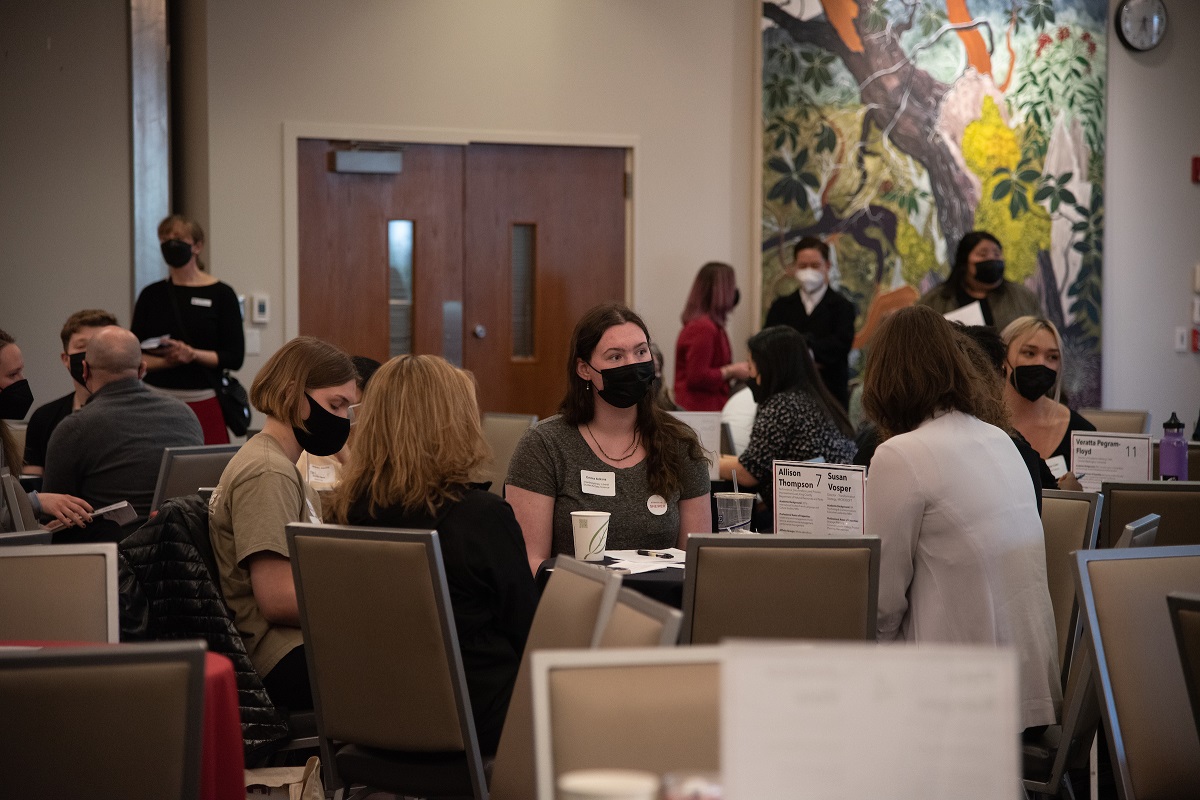
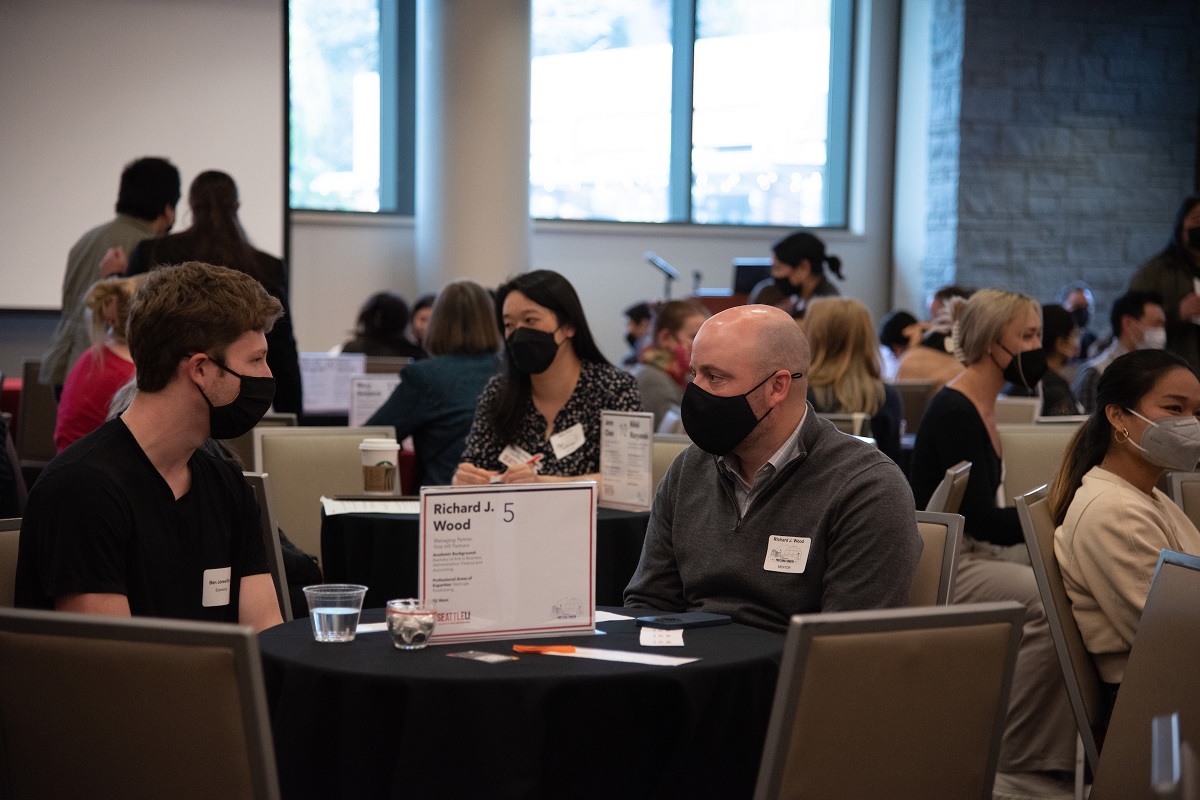
Students
MS, Kinesiology graduate student Ashley Buck, supervised by Dr. Sarah Shultz, has received a grant from The Biomechanics Initiative, Inc. The grant will support Buck's project to host a National Biomechanics Day event aimed at empowering and promoting women biomechanists. Utilizing the new Mobile Kinesiology Lab and engaging other undergraduate and graduate Kinesiology students, Shultz and Buck will bring the event to several high schools in the area and expand the accessibility of biomechanics and STEM education experiences to schools in areas that may not have the resources to otherwise provide these opportunities.
Northwest Undergraduate Conference on Literature 2022
The 2022 Northwest Undergraduate Conference on Literature was held March 19 at the University of Portland. Three Seattle University English majors participated this year.
McCalee Cain, senior, delivered two papers and won the Brass NUCL Award for Hardest Hitting Paper 2022 for her essay written for the SU class, “Art and Violence in Ayad Akhtar’s Disgraced: Reading Western Domination over Muslim Representation in Amir’s and Emily’s Relationship.” She presented a second paper from the class, “Re-Beginning in the East: Examining Intersecting Discourses of Gender and Orientalism in Chaucer’s Man of Law’s Tale.”
Stephen Leach, senior, received the number two spot for the Brass NUCL, the Honorable Mention, for his essay written for the class: “What Do We Say to the God of Death? Examining the Modern Relevance of Chaucer’s Pardoner’s Tale.”
Eddie Voloshin, a junior English major and University Honors IT student, presented a paper written for the seminar in C20-21 Literature, “Postmodernism into Post-Meaning: the Abdication of Meaning in Jessica Hagedorn’s Dogeaters.”
The Northwest Undergraduate Conference on Literature invites students to share their literary research and creative writing with a community of their peers. Professor emeritus Herman Asarnow founded the conference in 2004 in response to a question from his daughter—"why are there so many science fairs but no literature fairs?"
2022 Tau Sigma Transfer Student Honor Society Induction Ceremony
Twenty-one Arts and Sciences students were inducted into the Tau Sigma Transfer Student Honor Society at Seattle University’s 12th Tau Sigma Induction Ceremony on March 3, 2022.
Additionally, three Arts and Sciences Psychology students serve as officers of the club this year: Natalie Wiley, President; Erica Reynolds, VP of Community Service; Lindsey Schuler, Director of Communication. Laura Hauck-Vixie, Assistant Director of Academic Advising in the College of Arts and Sciences and Jennifer Bautista, Transfer Admissions Counselor, co-advise the chapter.
Tau Sigma National Honor Society is a national honor society designed exclusively for transfer students. Their mission is to "recognize and promote the academic excellence and involvement of transfer students." Tau Sigma provides its members opportunities to earn scholarships, attend leadership conferences, take leadership positions in the university, and serve others at the university and in the community, all while developing friendships and becoming a more integral part of the university to which they transferred.
Congratulations to the newest members:
- Julia Alvarez Serrano, Psychology
- Adolfo Bravo, Photography
- Christopher Brumett, Criminal Justice
- Chanarah Caupain, Communication and Media
- Shihui Chen, Interdisciplinary Arts, Arts Leadership
- Ripley Detlaff, Criminal Justice
- Jennifer Klabo, Creative Writing
- Ma Cielita Victoria, Maguddayao, Communication and Media
- Katrina Manacio, English
- Carmen Montelongo, Kinesiology
- Celica Najera, Criminal Justice
- Fabiano Nardone, Communication and Media
- Vy Nguyen, Psychology
- Olivia Okun, Design
- Ryan Pottinger, Philosophy
- Paige Prombo, Criminal Justice
- Abigail Reddam, Sociology
- Anthonny Ruiz, Communication and Media
- Lilian VanEk, Social Work
- Dawson Wheeler, Criminal Justice
- Grace White, Psychology
Alumni
Haleema Bharoocha, BA, Sociology ’18, will attend University of California, Berkeley, Goldman School of Public Policy the number one ranked school in public policy analysis to earn her Masters in Public Policy.
Jessica Boling, BSW ’07, has been named Assistant Deputy Executive Director of the Wisconsin Housing and Economic Development Authority.
Colina Bruce, MNPL, ’15, and her new business, Noir Lux Candle Co., are featured by Visit Seattle in “Celebrating Seattle’s Wonderful Women.” She is also an adjunct faculty member for Nonprofit Leadership and Director of Education Partnerships for the Center for Community Engagement at SU.
Jonathan Choe, BA Humanities in Teaching and Philosophy ’00, is entering the Jesuit community.
Gary Davis, MNPL, ’10, and Executive Director at Companis, led a conversation about ensuring board diversity at the Executive Director Forum on March 25.
Dr. Sally Guzmán, MNPL ’15, family and community engagement coordinator for the Edmonds School District, talked to KING 5 News for this story, ” Edmonds School District welcomes Afghan refugees.”
Melissa Laramie, BSW ’00, has been named Gwinnett County Public Schools chief communications officer.
Patience Malaba, MPA, ’20, was named the Executive Director for the Housing Consortium. Read about her here.
Lauren Morgan, MACJ ’16, is featured in “Doctoral candidate Lauren Morgan balances criminal justice research with training as elite water skier,” University of Missouri–St. Louis Daily.
Heather Mumby, BA, Political Science ’95, is running as an incumbent for the Big Fork, Montana school board.
Monica Nevi, BA, Sport and Exercise Science, ’12, will appear in the Upper Left Comedy Fest, May 12 through 14. Information and tickets here.
Shukri Olow, BA, Public Affairs, ’07 and MPA, ’08, is running for the 47th Legislative District House seat that includes parts of Kent, Auburn and Covington, Washington. Read about her here.
David Rue, MFA in Arts Leadership ’17, was part of a student-hosted series capturing “Artist Mental Health Stories” produced by KNHC-C89.5, operated by professional staff and students of Nathan Hale High School’s electronic media course. Listen here.
Alexandra Woolacott, MAP ’17, was featured by the Seattle Times for “Are you feeling ‘climate distress’? Here are one therapist’s tips on how to manage.”
Faculty
John C. Bean, PhD, Emeritus Professor, English, and June Johnson, Associate Professor of English, have recently provided a two-month series of Zoom consultations for a five-person faculty team from Westminster International University in Tashkent (WIUT), Uzbekistan. The team’s goal was to create a new undergraduate course focused on sustainable development in Uzbekistan using American pedagogical strategies for fostering critical thinking and argument. Employing principles of backward design, the faculty team will adopt pedagogical strategies modeled in Johnson’s textbook “Global Issues/Local Arguments” and in Bean’s “Engaging Ideas: The Professor’s Guide to Writing, Critical Thinking, and Active Learning in the Classroom.” The request for these consultation sessions came from Uzbek Professor Ijobat Juraeva, a 2019 participant in Seattle University’s Study of the United States Institute, funded by the US State Department and co-directed by Dr. Charles Tung (English) and Ken Allan (Art History). Professor Juraeva’s original request was for either Bean or Johnson to spend a month in Uzbekistan providing workshops in writing-across-the-curriculum, active learning pedagogy, and course design. Because of Covid, Professor Juraeva’s request was put on hold until 2022 when, under Dr. Tung’s leadership, it was re-imagined as consultation assistance for designing the new course. Simultaneously, Bean’s co-author for the 3rd edition of “Engaging Ideas” (Dan Melzer of UC Davis) provided six 50-minute digital workshops on writing across the curriculum for a larger group of professors at WIUT.
Andrew G. Bjelland, PhD, Emeritus Professor, Philosophy, published the op-eds “Too many Republican politicians are dancing with the devil” and “Show tolerance for the religious orientation of American companies” in the Salt Lake Tribune.
Kathryn L. Bollich-Zeigler, PhD, Assistant Professor, Psychology, interviewed Laurie Santos, host of the Happiness Lab podcast for “Whatever Happened to Happiness?” as part of The Crosscut Festival.
Rebecca Cobb, PhD, LMFT, Assistant Clinical Professor and Clinical Coordinator, Couples and Family Therapy contracted with Routledge to publish a follow up book to the current one she is working on. This second book, “The Therapist’s Notebook for Teletherapy with Children and Adolescents: Creative Interventions for Effective Online Therapy,” will focus on creative teletherapy interventions for children, adolescents, and families.
Elizabeth Dale, PhD, Associate Professor, Nonprofit Leadership, was included in several media stories:
- Fortune Magazine, “The mysterious MacKenzie Scott: How the secretive billionaire quietly worked to give away $12 billion in just 2 years,” (behind firewall)
- Fortune Magazine, “So far, the biggest beneficiary of Elon Musk’s $5.7 billion gift to charity may be: Elon Musk” (behind firewall)
- Daily Beast, “What Is Van Jones Doing With Bezos’ $100 Million?”
She published a chapter on “LGBTQ Philanthropy” in “Achieving Excellence in Fundraising, 5th Ed.” It is the leading publication of its kind for teaching the theory and practice of fundraising and the second time she authored this chapter for the textbook.
Gabriella Gutiérrez y Muhs, PhD, Professor, Modern Languages and Women Gender, and Sexuality Studies, published a chapter in “The Many Voices of the Los Angeles Novel” from Cambridge Scholars Publishing. She also spoke about Helena Maria Viramontes at the Madrid Lecture Series at Trinity University on April 7. It is available for viewing here.
Haejeong Hazel Hahn, PhD, Professor, History and affiliated with Women, Gender, and Sexuality Studies, Asian Studies, and Film Studies, published “Feminism and Empire” in The Routledge Global History of Feminism, edited by Bonnie Smith and Nova Robinson, Abingdon, UK & New York: Routledge, 2022.
Jacqueline Helfgott, PhD, Professor, Criminal Justice and Director, Crime & Justice Research Center, Elaine Gunnison, PhD, Professor, Criminal Justice, Criminology, and Forensics, and Director, Master of Arts in Criminal Justice, and Kim Satterfield, MACJ candidate, published the final report for the project, “Descriptive Evaluation of the South King County Pretrial Assessment and Linkages Services (PALS) Pilot Program.”
Dr. Helfgott participated in several news Interviews:
- KING 5 News and KREM, “Seattle crime is high, levels haven't reached historic peaks.”
- KOMO News, “Interim chief to present 2022 policing plan to Seattle city council committee.”
- KING 5 News. “Victims say Seattle-based charity bail group should stop freeing people charged with violent crimes.”
- Seattle Times, “Crime is up in Seattle. So why are city residents less fearful?”
Audrey Hudgins, EdD, Clinical Associate Professor, Matteo Ricci Institute, with two Universidad Iberoamericana Puebla colleagues, Guillermo Yrizar and Elena Ayala, wrote a chapter, “’Tenemos una vida de perros’: Separación de familias migrantes en tránsito durante la pandemia en Puebla“ for the book, Migracion y Ciudadanías: Poderes Móviles en Centro - Norte América, to be published in April 2022 by the University of Guanajuato. The article was based on a talk given at an international conference of the same name in July 2021. She contributed to the analysis and writing of “Análisis de contexto migratorio - Primer semestre de 2021,” a report produced by the Investigativo-Teórica Dimensión of and for the Red Jesuita Con Migrantes Centroamérica-Norteamérica. The report was published on October 6, 2021 and is available here.
Sonora Jha, PhD, Associate Dean for Academic Community and Professor, Department of Communication and Media, had her book “How to Raise a Feminist Son” included in W Magazine’s story, “18 Essential Feminist Reads, According to 6 Feminist Authors.”
Jiangmeng Liu, Assistant Professor, Communication, co-authored “Association between social network sites use and mental illness: A meta-analysis” with Qinghua Yang and Jian Rui for the Cyberpsychology: Journal of Psychosocial Research on Cyberspace, 16(1). She was also a guest speaker for Marketing and Communication Executives International, Seattle talking about her research in social media effect and influencer marketing.
Kira Mauseth, PhD, Senior Instructor, Psychology, traveled to Poland as co-lead of the WA State Behavioral Health Strike Team to help train volunteers to support refugees. Watch for more news; this story covers some of the work.
Allison Machlis Meyer, PhD, Associate Professor, English, just published the article “Women’s Shakespeare in Seattle: Regional Performance and Spectatorship” in a special issue of Shakespeare Bulletin, “Shakespeare on the Regional U.S. Stage.”
Susan Meyers, PhD, Associate Professor, Department of English and Director, Creative Writing Program, has a new creative essay coming out this spring in the New Orleans Review, and is presenting a paper this May at the Rhetoric Society of America Conference.
Alexander Mouton, MFA, Chair and Associate Professor, Art, Art History, and Design, attended CODEX VIII International Art Book Fair & Symposium in Berkeley, CA. His artist book, “Reconfigured Families” (2020) was purchased for the Rhode Island School of Design Fleet Library. A second artist book, “To A Place of Time, Held Within Four Walls” (2022) was purchased for Columbia University’s Rare Book and Manuscript Library.
Christopher Paul, PhD, Professor, Communication, presented at the Society for Cinema and Media Studies as part of a roundtable called “On Writing Historiographies of Game Studies: Scholars Reimagine the Field.” His presentation was called “Beyond Basic: Pushing Past Our Limitations.” He was quoted in “The 6 Best Free-to-play Video Games” in the Wall Street Journal.
James Risser, PhD, Professor, Philosophy, had his earlier book “Hermeneutics and the Voice of the Other” translated into Chinese by Peking University Press.
Nova Robinson, PhD, Associate Professor of History and International Studies, is pleased to announce the publication of the "Routledge Global History of Feminism" (February 2022), which she co-edited with Bonnie G. Smith. Based on the scholarship of a global team of diverse authors, including Seattle University’s Haejeong Hazel Hahn, PhD, Professor, History and affiliated with Women, Gender, and Sexuality Studies, Asian Studies, and Film Studies, and Natalie Cisneros, PhD, Associate Professor, Philosophy and Associate Appointment, Women, Gender, and Sexuality Studies, this wide-ranging handbook surveys the history and current status of pro-women thought and activism over millennia. The book traces the complex history of feminism across the globe, presenting its many identities, its heated debates, its racism, discussion of religious belief and values, commitment to social change, and the struggles of women around the world for gender justice.
James Sawyer, PhD, Professor Emeritus, Institute of Public Service, published the op-eda, “The humility to know when we don’t know,” and “Are LDS ‘True Believers’ more likely to fall for conspiracy theories?”, in The Salt Lake Tribune.
Tom Taylor, PhD, Acting Chair and Associate Professor, History, and affiliated with International Studies, is publishing a new book in June, “Modern Travel in World History”, (New York: Routledge, 2022). It is part of their “Themes in World History” series. This book focuses on both the evolving nature of travel, from land and sea routes in the 1500s, to the domination of planes and cars in the modern world and the important stories of travellers themselves. Taking a global perspective, the text places travel within the larger geopolitical, social, religious, and cultural developments throughout history. It emphasizes not only the role of technology innovation in the ways people travel but also how those changes affect social structures and cultural values. Tom Taylor explores the journeys of well-known travellers as well as ordinary people, each with different perspectives through the lens of gender, social class, and cultural background, and considers how fictional travellers define the importance of travel in the modern world. Why people set out on the sojourns they did, what they experienced, who they met and how they understood these cross-cultural encounters are important to not only understanding the travellers themselves but the world they lived in and the world their travels made. Several maps help illustrate important routes and destinations.
Kirsten Moana Thompson, PhD, Professor and Director, Film Studies, presented an invited keynote talk, “The Doors of Perception: Color, Surrealism and Disney Animation”, on March 12, 2022 at The Third International Symposium for Color, Science and Art, The International Research Center for Color, Science and Art, Tokyo Polytechnic University (TPU), Japan. She also reviewed Deborah Walker-Morrison’s book, “Classic French Noir: Gender and the Cinema of Fatal Desire,” in Projections, 16.2 (August 2022).
Charles M. Tung, PhD, Professor and Chair, English, presented the conference paper, “Modernist Clockwork and the Rescaling of Historical Possibility,” at the Modernist Studies Association Digital Conference, April 6, 2022. The paper was part of three panels on modernism and technology featuring contributors to the forthcoming volume, The Edinburgh Companion to Modernism and Technology.
Zachary D. Wood, PhD, Assistant Professor, Institute of Public Service, was interviewed for “ ‘Another tool for the toolkit’: Can social housing initiative help make Seattle more affordable?” on Dave Ross’s KIRO News Radio podcast. Read it here or listen here.
Arts & Sciences Events
Arts
-
"Embodiment: Gender in The Expanse," through June 15, Hedreen Gallery
Curated by Arielle Simmons. With vulnerability and empathy, artists Natalie Krick, Barry Johnson, Hanako O’Leary, Rafael Soldi, Kali Spitzer and Anthony White explore the expanse of gender with their practice. May 24, 6 p.m.: artists conversation
Read More about "Embodiment: Gender in The Expanse," through June 15, Hedreen Gallery
-
"BLOOM": 2022 Digital Design Senior Showcase, through May 13, Vachon Gallery
This year's cohort communicates their individual paths of growth that led to the existence of the tight-knit community of designers whose work is featured.
Read More about "BLOOM": 2022 Digital Design Senior Showcase, through May 13, Vachon Gallery
-
"Eurydice" by Sarah Ruhl, May 11-15, Lee Center for the Arts
This retelling of the Orpheus myth recenters the hero's journey on the heroine in a touching, darkly comic examination of loss and love
Read More about "Eurydice" by Sarah Ruhl, May 11-15, Lee Center for the Arts
-
"The Confluence Project" by Dr. Matthew Reynolds, May 12, 4:30 p.m., Wyckoff Auditorium
Presented in partnership with the Pigott Family Endowment of the Arts.
-
“Songs of Life," May 20 8 p.m., St. Joseph Parish
The Seattle University Choirs (Dr. Leann Conley-Holcom, Director; Dr. Lee Peterson, Assistant Director) in their final concert of the 2021-2022 academic year.
Read More about “Songs of Life," May 20 8 p.m., St. Joseph Parish
Books and Lectures
-
“Heavenly Learning”: Jesuit Science in Imperial China, May 16, 4 p.m., STCN 160
Florence C. Hsia, PhD, Professor of History of Science, Dept. of History, Univ. of Wisconsin-Madison delivers the 3rd Peter L. Lee Endowed Lecture in East Asian Culture and Civilization.
Read More about “Heavenly Learning”: Jesuit Science in Imperial China, May 16, 4 p.m., STCN 160
-
"The Case of the Missing Lightning Bat" by Victor D. Evans, May 17, 6 p.m., Casey Commons
The 2022 Sharon James Lecture, featuring Dr. Evan's new middle grade mystery, one of very few featuring a middle grade, LGBTQ African-American character.
-
Putin Confronts the Free World: A Discussion with General Barry McCaffrey, May 16, 6:30 p.m., Pigott Auditorium
“Conversations” series continues with General Barry R. McCaffrey, USA (Ret.), national security and terrorism analyst for NBC News, and Gary Locke, former ambassador to China.
-
"Black in Blue" by Carmen Best, May 23, 4 p.m., Stuart T. Rolfe Community Room
The former Seattle Police Chief talks about her new book. Sponsored by the SU Crime and Justice Research Center.
-
Jesuits and the Promotion of the Common Good in Latin America, May 26, 4 p.m., Wyckoff Auditorium
Fr. Jorge Salcedo MartÍnez, S.J. delivers the 2022 William F. LeRoux, S.J. Endowed Lecture. Reception to follow.
Graduate Program Information Sessions and Open Houses
-
Master of Social Work Virtual Information Session
Thursday, April 25 at 12:00 PM
-
Couples and Family Therapy Virtual Information Session with Dr. Kimberly Riley
Monday, May 6 at 9:00 AM
-
MA in Psychology Virtual Info Session
Wednesday, May 8 at 12:30 PM
-
Nonprofit Leadership Virtual Info Session
Monday, May 13 at 5:00 PM
-
Master of Public Administration Virtual Info Session
Tuesday, May 14 at 12:00 PM